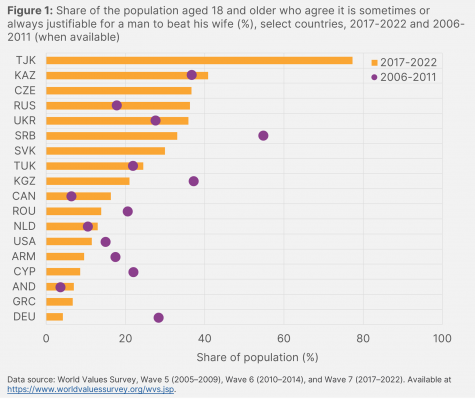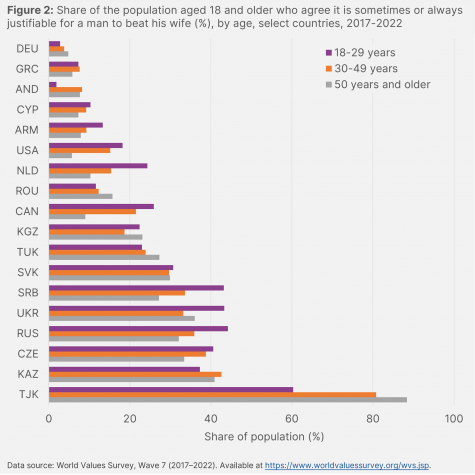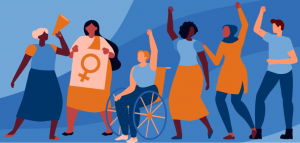In half of countries in Europe, North America and Central Asia with data, the belief that it is justifiable for a man to beat his wife is becoming more widespread.
This worrying trend stands out among the findings of the recent review of progress in the UNECE region towards priorities defined in the International Conference on Population and Development (ICPD) Programme of Action. In support of the 16 Days of Activism against Gender-Based Violence campaign that kicked off on 25 November, UNECE calls for commitment and practical measures from governments and all stakeholders in the region to put an end to violence against women.
“This trend must be a wake-up call for all of us in the region, men and women” said UNECE Executive Secretary and International Gender Champion Tatiana Molcean. “Changing attitudes is fundamental for preventing gender-based violence against women. A society in which such violence is accepted is one in which it can more readily occur.”
Mixed progress towards stemming the acceptance of violence against women
In the UNECE region, progress in this area has been mixed. In several countries, the share of adults who agree that it is sometimes or always justifiable for a man to beat his wife has decreased significantly over time. In Germany, for example, the share of adults who believe it decreased from 28 per cent in 2006 to 4 per cent in 2018. In Serbia, the share of adults expressing this opinion fell from 55 per cent to 33 per cent between 2006 and 2017. But in half of countries with data, the share of individuals who believe it is justifiable for a man to beat his wife has increased in recent years. (Figure 1).

Worrying trends amongst youth
Attitudes among younger people may be driving this trend in some countries. In 10 countries with recent data, young people aged 18 to 29 are more likely than people in older age groups to agree that it is justifiable for a man to beat his wife. Acceptance of violence against women is twice as high among young people aged 18 to 29 compared to those aged 50 and older in Canada, the Netherlands, and the United States of America. In most countries, men are more likely than women to believe it is justifiable for a man to beat his wife.

Better data required to end violence against women
Data on attitudes indicate to what extent violence against women is accepted in a society, but evidence on the number and characteristics of women and girls experiencing violence remains limited. The scarcity of statistical data on violence against women impedes understanding of the issue and the development of evidence-based policies for prevention, protection, and support. Many countries rely on administrative crime records to estimate the incidence of violence against women, but these data capture only officially reported incidents. Official estimates therefore vastly understate the scale of the issue. Some countries in the region have recently conducted surveys on violence against women, helping to close data gaps. Surveys conducted before the Covid-19 pandemic in select countries in Eastern and South-Eastern Europe suggest 30 per cent of women experienced some form of violence in the year before the survey. A new round of an EU survey on gender-based violence against women has been carried out between 2020 and 2023 and will provide important evidence on violence against women during the Covid-19 pandemic.
Older women experience gender-based violence too
The sexist attitudes and power imbalances that enable violence against women become more pronounced with age. Intersecting vulnerabilities mean some older women face a higher risk of experiencing violence, abuse, and neglect. Older women are overrepresented in institutional settings, where they face the risk of physical, emotional, and even sexual violence, which continues to occur in older age. Stigma and institutional ageism may prevent older women from reporting violence by caregivers at home. In her 2023 report on violence against and abuse and neglect of older persons to the Human Rights Council, the Independent Expert on the enjoyment of all human rights by older persons, Ms. Claudia Mahler, noted that sexual violence in old age remains the least reported and documented form of abuse of older persons, and that the lack of disaggregated data impedes a comprehensive understanding of its magnitude. The 2022 Rome Declaration emphasizes the widespread and urgent need for age-disaggregated and ageing-relevant data and statistics on this and other issues.
Countries recommit to action to address gender-based violence
The ICPD agenda calls on countries to ensure zero tolerance for gender-based violence and to address harmful gender norms and practices that impede gender equality and perpetuate discrimination against women.
At last month’s UNECE Regional Conference on ICPD, “Population and Development: Ensuring Rights and Choices”, countries from across the region renewed their commitments to human rights and gender equality. Several countries shared progress towards addressing gender-based violence. North Macedonia, for example, has adopted a new law on prevention and protection from gender-based violence, and Denmark has strengthened legal frameworks around intimate partner violence and killings. The Kingdom of the Netherlands has launched a multisectoral strategy to prevent, combat, and respond to sexual violence, and several countries have adopted consent-based laws around rape and sexual assault, in line with the Istanbul Convention.
Despite progress, discussions emphasized the ongoing challenge to eradicate violence against women. Both invited experts and member State delegates advocated for further action to raise awareness and address harmful norms and attitudes. Speakers expressed the need to involve men and boys in order to achieve gender equality and secure the human rights of women and girls. They also acknowledged the continuing relevance of the “leave no one behind” principle, and the need to ensure older women, women with disabilities, and other vulnerable groups are included in evidence and efforts to combat violence against women.
Read more


